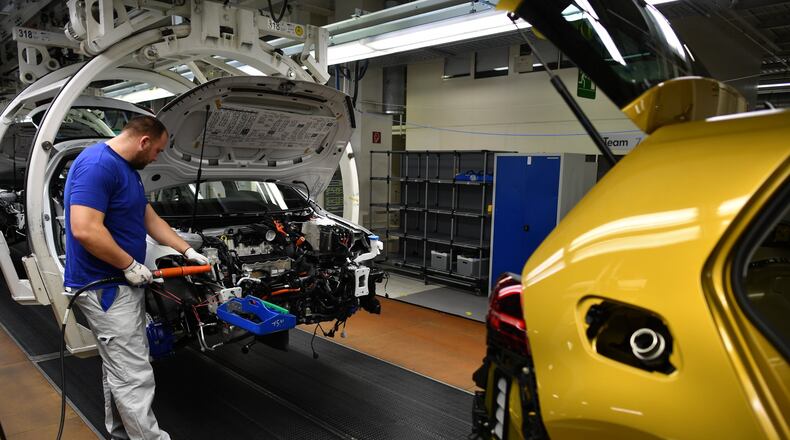“This is a type of economics reasoning that only Peter Pan could endorse,” said Edward Hill, a professor of public administration at Ohio State University. “I am absolutely certain that Mother Theresa is not in charge of the pricing department at an American steel company.”
A spokesman for Honda North America, which employs 15,000 people in production plants in Central Ohio, warned “history has shown that tariffs imposed on imported steel could raise prices on both domestic and imported material, thus causing an unnecessary financial burden on our customers.”
John Bozella, president and chief executive officer of Global Automakers, a trade group representing automotive manufacturers around the world, said, “Increased costs will make our industry less competitive and harm American workers, consumers, and our economy.”
RELATED: Trump to impose tariffs on imports of steel and aluminum
Bozella called the tariffs “a tax that will result in higher prices that consumers will ultimately bear.”
If the new tariffs spark a major trade war, Ohio manufacturing and agricultural exports also could be hurt. A new state report shows that last year only eight other states exported more goods than Ohio, which exported nearly $51 billion worth of goods, including machinery, vehicles and parts, oil seed and grains.
Trump announced the new tariffs — 25 percent on steel imports and 10 percent on aluminum imports — at a White House gathering that included workers from the two industries and Vice President Mike Pence, Treasury Secretary Steve Mnuchin and Commerce Secretary Wilbur Ross.
The administration exempted Canada and Mexico from the new tariffs, although administration officials suggested that exception would be tied to both countries agreeing to U.S. demands on a revised North American Free Trade Agreement.
“These actions we are taking today are not a matter of choice, they are a matter of necessity for our security,” Trump said, adding “a strong steel and aluminum industry is vital to our country.”
RELATED: Senators press Trump to protect U.S. steel production
Trump indicated that the tariffs could be removed on a case-by-case basis. But while he criticized China for flooding the world market with inexpensive steel, his decision would largely damage steel producers that export to the United States, such as Japan, Germany, Brazil and South Korea.
Sen. Sherrod Brown, D-Ohio, who has urged the Trump administration to penalize countries such as China, said he was “glad” Trump imposed the tariffs. I would have done it differently. I would have targeted China. I’m glad he is flexible, but once he makes these decisions he needs to stick to them.”
Brown tartly dismissed fears that tariffs would lead to job losses, saying, “This is not the first time we have heard the sky is falling from free traders. The fact is people crying the sky is falling are the same people who pushed through (trade deals) which led to unemployment in Dayton, Mansfield and Cleveland.”
Brown is among those with the most at stake politically if the tariffs provoke a trade war and higher prices. He is up for re-election later this year.
“Sherrod has made a career about running against trade,” said James Ruvolo, former chairman of the Ohio Democratic Party. “It hasn’t hurt him yet. I think this plays right into his wheelhouse.”
“The election is in November,” Ruvolo added. “I doubt you will see skyrocketing prices immediately — if ever — so I doubt it will play in the election.”
But Trump’s decision led to a split among Republicans who tend to favor free trade. Ohio Gov. John Kasich complained “these actions will invite friction and retaliation from our allies as well as a loss of American jobs and higher prices for American consumers.”
House Speaker Paul Ryan, R-Wis., said he disagreed with “this action and fear its unintended consequences,” while Rep. Steve Stivers, R-Upper Arlington, said while he favors “anti-dumping policies,” he too is concerned the tariffs won’t be successful.
In large part because NAFTA integrated the North American automotive market, nearly half of Ohio’s exports last year went to Mexico and Canada.
Ohio farmers exported $1.8 billion worth of soybeans last year, with nearly $700 million to China and $351 million to Mexico.
Joe Cornely, a spokesman for the Ohio Farm Bureau, warned that “trade is crucial to Ohio farmers and the state’s entire economy. We’re telling the administration and Congress that while we understand the need to protect American industries and jobs, the consequences of trade actions on farmers must be part of the decision making process.”
FIVE FAST BUSINESS READS
• JC Penney cuts 360 jobs in stores, corporate headquarters
• Could Dayton see a hyperloop stop? City included in feasibility study
• Macy's outlet store to open at shopping center in Dayton area
• Check out this $1 million home for sale in Clearcreek Twp.
